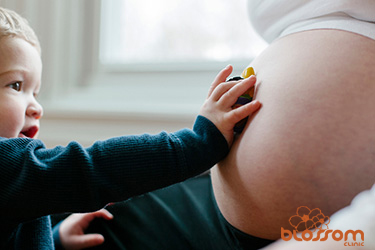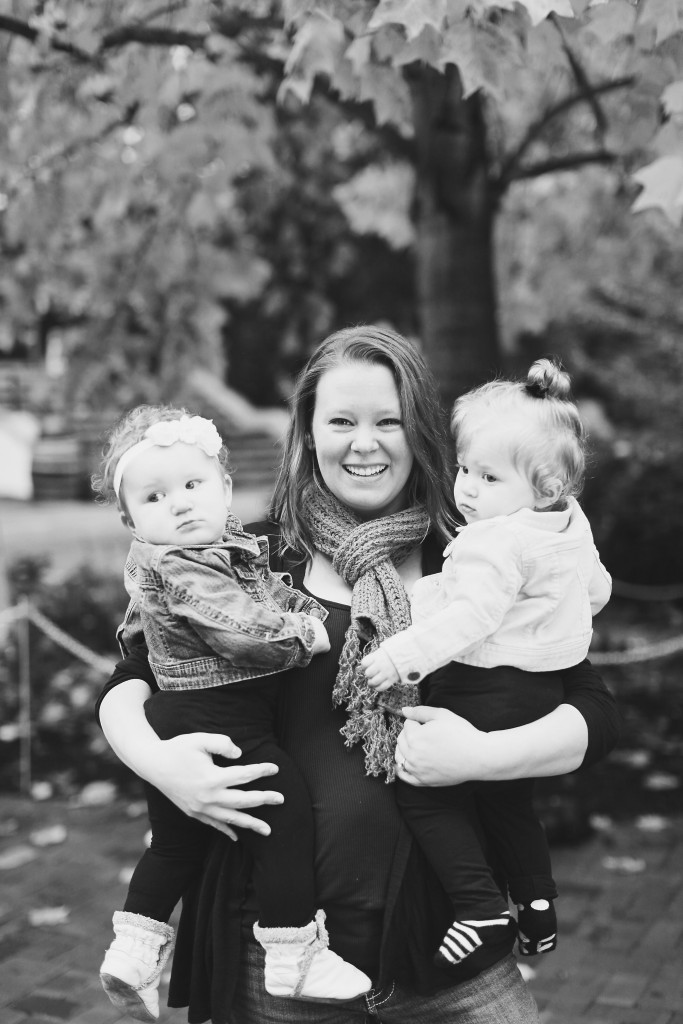As a doula who specializes in working with moms expecting multiples “MOMs”, I’ve been there in that first ultrasound where they find out that not only is their dream of having a baby coming true, but times two or three! Often it takes a few months for the idea of carrying, delivering and raising two to sink in. I remember one conversation with a mama who thought, “What will I do with two? Do I have to have a c-section? How can I care for two while recovering from major surgery?!”

By hiring an experienced multiples doula, you can navigate all the unique circumstances that come from a multiples birth.
Good news, MOMs! Carrying twins (or even triplets) does not necessarily mean that you will need to have a cesarean birth! In the past 21 sets of multiples, 17 were able to have a vaginal birth! Many variables come into play when deciding what sort of birth MOMs have.
The very first variable is whether your Baby A is head down (Baby A is the lowest, the one most likely to be born first of the two.) According to the American College of Gynecology, a vaginal birth should be attempted if at least Baby A is head down assuming mother and baby are otherwise healthy.
An early conversation with your OB about policies surrounding twin births at your hospital of choice can really help guide you to understanding the choices you have as the birthing mother. All of our local hospitals do have a policy of MOMs pushing in the OR, as a safety net in case a cesarean is needed quickly. But, did you know that you can often still follow all of your other birth preferences? These can often include delayed cord clamping, opting out of various newborn procedures, and immediate skin to skin and breastfeeding!
By hiring an experienced multiples doula, you can navigate all the unique circumstances that come from a multiples birth. Often, a mother will deliver their first baby, and that baby may need to go to the NICU. When this happens, frequently the mother wishes the partner to go with the baby to assure that they can make decisions as needed for their newborn.
What is often forgotten is that there will be another birth happening. Having two support people in the room assures the mother that they won’t be birthing Baby B alone. Your doula can also coordinate with your partner to get frequent text and picture updates about Baby A, if they are out of the room, to show mom. Your doula also will remain with you throughout recovery and until you are reunited with your partner and/or able to go visit your babies (assuming they are not both with you).
My very first twins birth was with a lovely lady named Tia and her husband Dave. I spent a lot of time prenatally discussing things to expect during their birth of their baby girls. But, and I can admit this now, I had NO idea what I was doing. This was literally my second birth that I attended as a trained doula, and I didn’t know anything about how the birth would go, and how it would be different than the standard singleton.
Tia was an absolute rockstar. She was in serious labor far before I got to her, and was coping with some challenging medical “bumps in the road.” By the time I got to her, some concerning things were cropping up, and I recognized the sign posts or urgency clearly. When the room got quiet, I sat next to her and very calmly explained why the medical professionals were concerned and where this might lead her labor. At the time, the facts were a neon sign pointing to a cesarean birth if she didn’t progress rather quickly. Clearly, those were not the words I used, but the message was a calm one of “there are some things they are watching closely, let’s work hard to focus on your labor so you can meet the girls!” My intent was to be the one who said it first, just in case her OB came in and said the same thing, she wouldn’t be blindsided. I still remember the tears she had, she knew already that things weren’t ideal.
However, very quickly her labor progressed, and she was moved to her birth place, the OR. She was moved over to the OR table, and started pushing like a fierce mother. She channeled all that “Nope, not going to have a cesarean birth” into productive pushing! She worked hard, and birthed her first baby girl. Her husband went over to take pictures of his first little girl, and I gave Tia a pep talk. She was extremely tired, and very dehydrated at this point, so we talked a lot about how she was doing so well, and she was halfway there.
During this time, her first little girl needed to have some additional eyes on her, and was being transferred to the NICU. This was NOT a moment I planned for in the slightest, and I knew that I would suddenly be alone with Tia for her second pushing session and birth, as Dave would go with his first born.
This moment is the cornerstone of why a doula in a twin birth is so important. Without a doula, Tia would have been without emotional and physical support from a person who knew her personally, and knew what she needed. She wouldn’t have anyone to look in the eye for reassurance and a sense of familiarity. But her doula was there. I encouraged her, I wiped off her forehead, I told her she was doing an amazing job. Tia birthed her second baby girl with power and strength. I stepped back and started taking pictures and creating memories for her husband, who was also doing an exceptionally important job, making medical decisions for his baby girl in the NICU.
Having a doula for any birth, I feel, is important. But having a doula for a multiples birth is vital.
As an experienced Multiples Doula, I would love to chat with you more if you are expecting two or three little ones! I offer a complimentary meet-and-greet to answer any of your questions and for you to get to know me better! You can reach me through my website: Northwest Birth Services.
Contributed by Julia Schetky, SB, CD (DONA) of Northwest Birth Services and Do It All Doulas.











